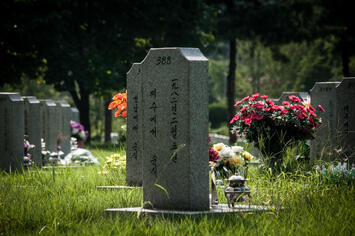
It’s important not to let last month’s tragic shootings completely overshadow the significance of Lunar New Year. For us, this holiday normally means a late morning trip to the hillside orchard in my wife’s hometown to visit her parents’ graves. The land, though, is no longer the family’s, and the graves will soon be moved.
The town is Icheon, Gyeonggi Province, Korea, where I was stationed in the Peace Corps 47 years ago. Then a small farming community complete with market days reminiscent of Thomas Hardy’s 19th Century England, Icheon today is a municipal county of 200,000 people, as well known for its semiconductors as its rice and celadon pottery.
The orchard area was once regarded, in a less inclusive age, as the edge of civilization. The hills and low mountains beyond it, as in most towns, were traditionally inhabited by the community’s unfortunates, and there were stories, not all apocryphal, of tigers into the early 20th Century. The land now abuts a city park and scenic reservoir. The city has condemned the family land to expand the park and the graves have to go.
It is just as well. Private gravesites such as these are traditionally tended by sons and grandsons. The sons are both deceased. One grandson is in Atlanta, the other busy keeping his small business afloat in the country’s hyper-competitive marketplace. The daughters and sons-in-law, a not atypical mix of Catholics, Protestants and traditionalist Confucians, are almost all in their 70s and 80s. Their graveside hymns, praise songs, traditional veneration offerings and mostly good-natured debates (can the food offerings be eaten?) are already fading as memories. The younger generation would rather holiday abroad on the rare breaks from work and school.
The orchard was the last of the family’s considerable landholdings. Many in Korea claim ties to the royal court in Seoul. Our family’s claim appears to be true: sometime during the 19th Century an ancestor was pensioned off to this once rural area and given a lot of land. Some was taken during the land reforms that followed the Korean War. Much was farmed to produce the town’s famous rice. All but the orchard was sold off after my father-in-law’s death.
The hillside was originally dedicated to peaches. My father-in-law, a gentleman farmer, one-time mayor and life-long calligrapher, adopted the pen name “Peach Orchard” for his calligraphy, some of which is featured on a column in the park. Chestnuts, immensely popular in cold weather and requiring less work, eventually replaced the peaches. The chestnuts eventually gave way to ginkgoes. Trespassing park visitors used to collect the ginkgoes but they no longer bother.
When my father-in-law was buried, it was hard to locate traditional grave diggers to remove and rebuild the characteristic grass mound that marks the graves. There seemed to be a lot of shouting over the quality of the work, which matters because poorly built mounds erode quickly. Amidst the din, we burned the deceased’s clothes between the graveside and the trees.
These hillside Korean graves are a world away from Lake View Cemetery in Cleveland, Ohio, where my parents are buried. Nearby are memorials to John D. Rockefeller, a Clevelander before he became a New Yorker, and the ill-fated James A. Garfield, the area’s sole claim to U.S. presidency. A lone gingko tree stands beside the Garfield Memorial and the lake can be seen in the distance.
Visiting either gravesite gives one a profound sense of contingency. An ancestor is pensioned off to the countryside and a young woman grows up in a small farm town rather than the capital city. Forebears cross the Atlantic to work in the steel mills that once lined Youngstown’s Mahoning valley and her future husband is raised in Northeast Ohio rather than Southwest England. As our societies, Korea included, increasingly struggle against human boundaries of any sort, no one can exchange the place where he or she was born, or diminish the appeal of its quiet, sacred spaces.
We’ll miss the hillside in Icheon but will enjoy the expanded park. Father-in-law, civic minded for almost all of his 99 years, would almost certainly have approved.
After obtaining his JD degree from Harvard Law School, Edward Purnell practiced for 20 years with an international law firm, concentrating on U.S. federal income taxation. He joined the faculty of Handong International Law School in 2011 and has lectured on business law and ethics in Africa, South America, and Southeast Asia.
Photo: Jordi Sanchez via Flickr under CC 2.0 License.












